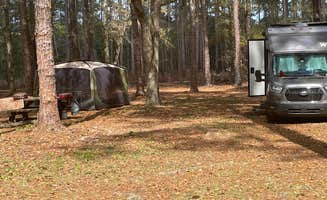Dispersed camping opportunities near Havana, Florida extend throughout the Apalachicola National Forest, which encompasses over 632,000 acres of North Florida wilderness. The forest terrain is primarily flat with sandy soil and pine forests, creating variable road conditions that can challenge visitors during Florida's frequent rain. Summer temperatures regularly exceed 90°F with high humidity, while winter nights can occasionally drop below freezing.
What to do
Boating access points: Porter Lake Dispersed Camp provides direct water access for kayakers and anglers. "The river is beautiful to boat or kayak and fish," notes one Porter Lake visitor who appreciated the isolation from civilization.
Wildlife observation: The forest supports diverse wildlife populations including deer, turkey, and numerous bird species. Multiple hunt camps serve as bases for wildlife viewing during non-hunting seasons. Buckhorn Hunt Camp offers "reasonably private" spots that aren't "all that busy outside of hunting season," according to a recent camper.
Photography opportunities: The wilderness setting creates natural lighting conditions ideal for forest and water photography, particularly during early morning hours when fog often rises from the waterways. Twin Poles Hunt Camp provides access to less-visited forest sections with minimal human infrastructure in view.
What campers like
Remote location: The significant distance from urban areas creates a true wilderness experience. A camper at Porter Lake Dispersed Camp appreciated that it was "at least 30 miles either way on F13 (dirt road to campground) and other routes to any type of civilization."
Night sky viewing: Limited light pollution in the forest allows for exceptional stargazing opportunities when weather permits. The lack of artificial lighting at Cliff Lake Hunt Camp creates ideal conditions for astronomical observation.
Quiet evenings: While forest roads experience traffic during daylight hours, nights provide natural soundscapes. As one Porter Lake camper observed: "There are a lot of logging trucks who use the road during the day and other vehicles but at night total quiet just the wildlife."
What you should know
Road conditions: Forest service roads require careful navigation, especially in wet conditions. Four-wheel drive vehicles provide advantages during rainy periods when sandy and clay sections become challenging. Buckhorn Hunt Camp received this assessment: "Easy to find and roads in are OK."
Limited facilities: Even sites with basic amenities offer minimal services. Porter Lake features "vault toilets and a water spigot. They say non-potable but there are no signs," according to one visitor who spent time there.
Facility maintenance issues: Previous amenities may no longer be available. At Buckhorn Hunt Camp, a visitor reported they "did have portable toilets but some drunk idiots smashed them. Does have a trash bin."
Tips for camping with families
Site selection: Families should prioritize Porter Lake for its basic facilities and water access. One visitor found it a "nice spot for a quick getaway from city life," though they noted "lots of road noise from the nearby bridge."
Water activities: Children often enjoy the lake access, but supervision remains essential as designated swimming areas do not exist. The waterways offer natural cooling during hot Florida days.
Noise considerations: Proximity to forest roads can affect noise levels at certain times. Traffic patterns include logging operations that pause overnight, providing quieter sleeping conditions.
Tips from RVers
Space limitations: Most free camping near Havana, Florida accommodates smaller recreational vehicles only. Standard-length travel trailers can access Porter Lake with caution, but larger motorhomes face significant challenges on narrow forest roads.
Ground conditions: Seasonal variations affect ground firmness significantly. During dry periods, sandy areas may cause traction problems, while wet seasons create soft spots that risk vehicle immobilization.
Limited turnaround space: Forest camping areas typically offer minimal maneuvering room. Backing into sites or planning exit routes before setup prevents difficult situations, particularly with larger rigs or trailers.


